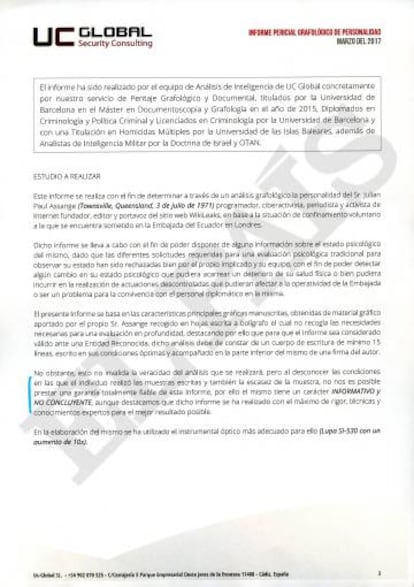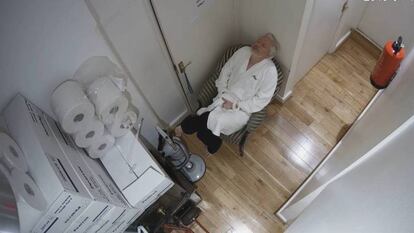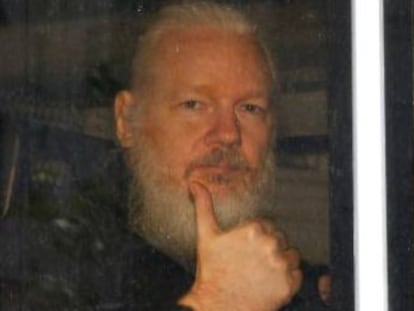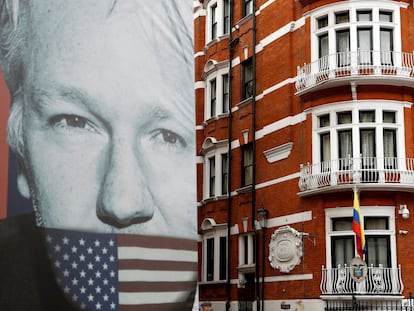Spanish security company spied on Julian Assange’s meetings with lawyers
EL PAÍS has had access to video, audio and written reports showing that the WikiLeaks founder was the target of a surveillance operation while living at the Ecuadorian embassy in London

Julian Assange was spied on 24 hours a day during the time that he spent at the Ecuadorian embassy in London, where he took refuge for seven years.
Documents, video and audio material that EL PAÍS has had access to show that a Spanish private defense and security firm named Undercover Global S. L., which was tasked with protecting the diplomatic building between 2012 and 2018, instructed its men to collect all possible information about the cyberactivist, particularly regarding his lawyers and collaborators.
Assange was so paranoid about being spied on that he conducted some of his meetings inside the ladies’ bathroom
Several video cameras, which were equipped with audio recording capability between December 2017 and March 2018, recorded dozens of meetings between the WikiLeaks founder and his attorneys and visitors. At these meetings, Assange’s legal defense strategy was discussed.
The recording equipment picked up on several secret plans drafted by Assange’s team to spirit him out of the embassy in disguise and take him to Russia or Cuba. The projects were never executed because the Australian-born activist refused, as he considered this solution “a defeat.”
UC Global’s feverish, obsessive vigilance of “the guest,” as he is described in the security firm’s notes, became more intense when Lenin Moreno became the new president of Ecuador in May 2017. It was Moreno who turned Assange over to British authorities. His predecessor, Rafael Correa, had granted him asylum and allowed him to stay at the embassy in London for seven years.
The security employees at the embassy had a daily job to do: to monitor Assange’s every move, record his conversations, and take note of his moods. The company’s drive to uncover their target’s most intimate secrets led the team to carry out a handwriting examination behind his back, which resulted in a six-page report. Company employees also took a feces sample from a baby’s diaper to check whether Assange and one of his most faithful collaborators were the child’s parents. This intelligence work had nothing to do with protection duties.
The security team for the Spanish company, which is based in Puerto Real (Cádiz), would write up a confidential report each day and send it to the company chief, David Morales, a former member of the military who trained with the special ops unit of the Marine Infantry, the marine corps of the Spanish Navy.

The degree of detail found in these reports illustrates how the company was bent on accumulating as much information as possible on a man who is indicted on 18 counts for leaking thousands of cables from the US State Department, as well as secret information about the wars in Iraq and Afghanistan.
“Great exaltation and nervousness by the guest after receiving news about the sentence commutation for [Chelsea] Manning [the soldier accused of passing secret documents to WikiLeaks],” reads the January 17, 2017 report. “Julian is providing a lot of information. The guest keeps writing in his agenda. You can feel the tension in the room. The guest hides his agenda with his hands at all times. Stella peeks out the door, thinking somebody could be listening in,” writes the security employee about the visit made by Walaman Adan Robert on January 12, 2017.
Another report dated January 21, 2017 says: “3.30pm-6.28pm. Pamela Anderson. They exchange information through notes. They take pictures inside the meeting room. The voice-distortion device is on at all times.”
On February 5 of that same year, the report says: “Approximately since 9pm, both the guest and Stella are moving things from the bedroom (clothes, mattress, suitcases, etc) to the entrance room. It is 11.35pm and they’re still at it.”
One of the visitors who elicited the biggest response from the Spanish security company was Andy Müller-Maguhn, a known German hacker. On one of his visits to Assange, security personnel photographed the inside of his travel bag and the numbers on his cellphones.
But if the security guards were obsessed with capturing every last detail about the “guest” staying at the “hotel,” the WikiLeaks founder was no less obsessed about avoiding being spied on. Every time he met with his lawyers and visitors, Assange would first turn on the aforementioned voice-distortion device, which was concealed inside a lamp. However, this did not prevent audio-recording equipment from capturing every conversation. Some videos show the cyberactivist writing with a folder covering the sheet of paper, to prevent any potential cameras from zooming in on his notes.
The security employees at the embassy had a daily job to do: to monitor Assange’s every move, record his conversations, and take note of his moods
Assange was so paranoid about being spied on that he conducted some of his meetings inside the ladies’ bathroom, which he considered a safe place. A report written by a security employee named José Antonio on January 15, 2017 says: “11.18am Aitor Martínez [Spanish lawyer] brings a briefcase, a telephone and a laptop; 11.20am guest, Stella and Aitor Martínez head for the ladies’ room, where they hold the meeting. 1pm: they exit the ladies’ room.” A few days earlier, on January 9, another employee reported on Assange’s meeting with his lawyers Melynda Taylor, Jennifer Robinson, Aitor Martínez and Baltasar Garzón.
David Morales, the owner and director of UC Global S.L. declined to say whether his company spied on Assange. “All the information is confidential and it belongs to the government of Ecuador. We simply did a job. I cannot comment on anything that we did there, I can’t provide any details,” he said in a telephone conversation.
Asked directly whether they spied on Assange, the answer was: “We have our ethical and moral rules, and none of them were violated.”
The interest in monitoring Assange’s meetings with his lawyers did not end when the Lenín Moreno administration canceled the contract with UC Global and hired Ecuadorian company Promsecurity to take its place. Video cameras continued to record all meetings, and at least on one occasion, either embassy personnel or the new security team photographed a folder brought in by the lawyer Aitor Martínez during a meeting break.
These photographs, as well as dozens of video and audio recordings, were recently used in an extortion attempt against Assange by several individuals based in Alicante, Spain. The courts are investigating the case, and two of the alleged extortionists were arrested.
Meanwhile, the UK has approved a request for Assange’s extradition made by the US, where he faces 18 charges for leaking classified material.
English version by Susana Urra.
Tu suscripción se está usando en otro dispositivo
¿Quieres añadir otro usuario a tu suscripción?
Si continúas leyendo en este dispositivo, no se podrá leer en el otro.
FlechaTu suscripción se está usando en otro dispositivo y solo puedes acceder a EL PAÍS desde un dispositivo a la vez.
Si quieres compartir tu cuenta, cambia tu suscripción a la modalidad Premium, así podrás añadir otro usuario. Cada uno accederá con su propia cuenta de email, lo que os permitirá personalizar vuestra experiencia en EL PAÍS.
¿Tienes una suscripción de empresa? Accede aquí para contratar más cuentas.
En el caso de no saber quién está usando tu cuenta, te recomendamos cambiar tu contraseña aquí.
Si decides continuar compartiendo tu cuenta, este mensaje se mostrará en tu dispositivo y en el de la otra persona que está usando tu cuenta de forma indefinida, afectando a tu experiencia de lectura. Puedes consultar aquí los términos y condiciones de la suscripción digital.
More information
Archived In
Últimas noticias
Most viewed
- Reinhard Genzel, Nobel laureate in physics: ‘One-minute videos will never give you the truth’
- Oona Chaplin: ‘I told James Cameron that I was living in a treehouse and starting a permaculture project with a friend’
- Pablo Escobar’s hippos: A serious environmental problem, 40 years on
- Chevy Chase, the beloved comedian who was a monster off camera: ‘Not everyone hated him, just the people who’ve worked with him’
- Why we lost the habit of sleeping in two segments and how that changed our sense of time











































